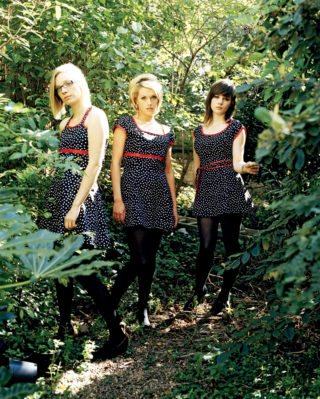Did Rose Elinor Dougall Love 2005?
Ten years ago, The Pipettes upset a lot of people as they dared to construct a conceptual bubblegum pop project from the DIY playbook

Ten years ago, The Pipettes upset a lot of people as they dared to construct a conceptual bubblegum pop project from the DIY playbook
It’s been an interesting process trying to piece together the events of 2005. I had only just moved to London at the end of 2004 and was living in Camberwell, studying at Camberwell College of Arts, but The Pipettes were already well underway by this stage. 2005 was definitely a pivotal year for us as a band. Lots of different things happened that year. One of the original members, Julia, left the band and was replaced by Gwenno (Saunders). We signed to Memphis Industries, went on our first proper tours and recorded our album. I remember being really chuffed when I got £100 as an advance.
I was discovering London, particularly London at night, through the prism of playing shows all over the city, but I definitely remember feeling at odds with the prevailing music scene, as that was the height of the Camden/Libertines scene… We were thrust into that live circuit but it really had nothing to do with us as a band. We felt like outsiders in that way, a bit like we’d snuck in through the back door.
I particularly remember a show we played at a small festival in Sweden called Emmaboda. We weren’t particularly high up the bill, but even before we’d played there were hundreds of people there waiting for us to come on. It was the first time I thought, ‘shit something’s going on here’, when there were girls crying and desperate to meet us after the show.
In terms of lowlights, Glastonbury that year sticks firmly in my mind. We had 4 shows booked for the festival, but there was a series of events that begun with our then manager eating too many magic mushrooms and ill advisedly parking our van (containing all our equipment) in the middle of a production area. This led to it being driven off site and left open in a field somewhere, not long after a torrential downpour. Somewhere along the line our sixty-year-old driver got locked in a Portakabin by a crazed stage manager on PCP, all of our gigs got cancelled and ended with me throwing my keyboard in a bog during a cheap whisky-fuelled tantrum.
I suppose those were the last years where there was still the money in the industry, and the economy in general, for lots of bands to really get a chance at a proper bite of the cherry. Erroneously or not, London felt like it was at the centre of things for a little while, and we wanted to exist naturally and unapologetically.
My understanding of feminism developed very rapidly throughout that time. It was only really then that I experienced the sharp end of chauvinism and the ugly side of that particular breed of male music industry type, but it served to strengthen and define our ideas. I was only 19, and I think I chose to ignore quite a lot of that energy, but also I was only really just starting to understand the power and vulnerability that comes with putting yourself on stage. I know Becki and Gwenno, who were a little older than me, were much more sensitive and aware of all of that shit.
Feminism is a far more prominent part of the general discourse now, in the media and beyond, but I think all of the same issues still exist, just perhaps in a slightly different shape, and I certainly think it would be very hard for a band like The Pipettes to find a record deal now.
We stood out, as there weren’t really any other bands doing what we were doing, but there were loads of misconceptions about us, many of which we welcomed. We were quite a strange band, in the sense that we were very ambitious, wanting to be in the charts and be a proper pop band, but coming at it from a DIY background and perspective. We liked being confusing. That dichotomy was probably one of the things that drove the project forward, but perhaps it made it hard for people to know where to position us. The thing about the band for me was that it was an exploration of the concept of ‘pop music’ and how those classic ideas could find a way to exist 50 years after their inception. We found all of those guitar bands of that time so dreary – that skinny white boy with a guitar so limited – we wanted to escape all that; not compete with it. It meant that some of the reviews we got were savage – we were a pretty easy band to hate, but we developed a really ardent, loyal fanbase, which was all we really cared about.
For me, the ‘role’ [of being a Pipette] morphed quite dramatically throughout my time in the band. In the end, I found the expectations from the label we were on (by this time Interscope) impossible to reconcile with what motivated me to be in the band in the first place, which led to me leaving at the start of 2008. I had such an amazing experience with that band over the 5 years I was part of it – those were truly my formative years as a musician and a young woman, and I’m immensely proud of what we achieved. I just feel that it was only ever meant to exist for a certain moment in time, and it was inevitable that I would have to go and explore different ideas.